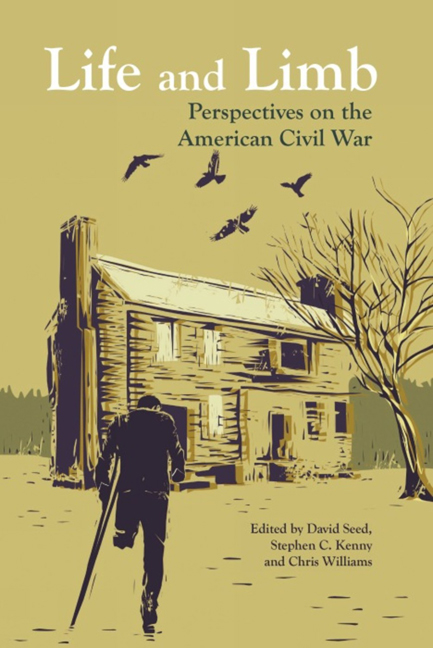Book contents
- Frontmatter
- Contents
- List of Illustrations
- Acknowledgements
- Introduction: Civil War Voices and Views
- MEDICAL AND SURGICAL MEMOIRS
- ACCOUNTS OF NURSING
- MEDICAL FACILITIES AND PATHOLOGY
- PHOTOGRAPHY
- AMPUTATIONS AND PROSTHETIC LIMBS
- ‘The Invalid Corps’ (song)
- The Case of Napoleon Perkins
- The First Amputee: ‘Record of Services’
- Testimonial Letter
- The Salem Leg (brochure)
- Testimony of Wearers (The Salem Leg: Under the Patronage of the United States Government for the Use of the Army and the Navy)
- The Human Wheel: ‘The Human Wheel, Its Spokes and Felloes’
- ‘The Case of George Dedlow’
- ‘Phantom Limbs’
- IN THE FIELD OF BATTLE
- POST-WAR NARRATIVES
- Contributors
- Select Bibliography
- Index
- Plates
‘The Case of George Dedlow’
from AMPUTATIONS AND PROSTHETIC LIMBS
- Frontmatter
- Contents
- List of Illustrations
- Acknowledgements
- Introduction: Civil War Voices and Views
- MEDICAL AND SURGICAL MEMOIRS
- ACCOUNTS OF NURSING
- MEDICAL FACILITIES AND PATHOLOGY
- PHOTOGRAPHY
- AMPUTATIONS AND PROSTHETIC LIMBS
- ‘The Invalid Corps’ (song)
- The Case of Napoleon Perkins
- The First Amputee: ‘Record of Services’
- Testimonial Letter
- The Salem Leg (brochure)
- Testimony of Wearers (The Salem Leg: Under the Patronage of the United States Government for the Use of the Army and the Navy)
- The Human Wheel: ‘The Human Wheel, Its Spokes and Felloes’
- ‘The Case of George Dedlow’
- ‘Phantom Limbs’
- IN THE FIELD OF BATTLE
- POST-WAR NARRATIVES
- Contributors
- Select Bibliography
- Index
- Plates
Summary
Silas Weir Mitchell (1829–1914), was a Philadelphia physician, invited in 1863 to co-direct the Turner's Lane Hospital for nervous diseases in Philadelphia by the Surgeon General of the US Army. He later recorded that ‘new modes of treatment were devised, and gymnastic classes instituted, under the care of intelligent sergeants of the invalid corps; electricity was constantly employed, and hypodermic medication – at that time somewhat novel – was habitually resorted to, and its effects carefully studied’; in Injuries of Nerves and their Consequences (Philadelphia: J.B. Lippincott, 1872), pp. 10–11.
Mitchell became a pioneer of the study of neurology and ‘causalgia,’ identifying the ‘phantom limb’ sensation experienced by amputees and dramatized in the story above. The ‘stump hospital’ was the popular name for the South Street Hospital in Philadelphia, so called because of their large number of amputations.
‘The Case of George Dedlow’ first appeared anonymously in The Atlantic Monthly of July 1866, collected in The Autobiography of a Quack and Other Stories (New York: The Century Company, 1900), with the following introduction:
‘The Case of George Dedlow’ was not written with any intention that it should appear in print. I lent the manuscript to the Rev. Dr. Furness and forgot it. This gentleman sent it to the Rev. Edward Everett Hale. He, presuming, I fancy, that every one desired to appear in the Atlantic, offered it to that journal. To my surprise, soon afterwards I received a proof and a check. The story was inserted as a leading article without my name. It was at once accepted by many as the description of a real case. Money was collected in several places to assist the unfortunate man, and benevolent persons went to the ‘Stump Hospital,’ in Philadelphia, to see the sufferer and to offer him aid. The spiritual incident at the end of the story was received with joy by the spiritualists as a valuable proof of the truth of their beliefs.
The following notes of my own case have been declined on various pretexts by every medical journal to which I have offered them.
- Type
- Chapter
- Information
- Life and LimbPerspectives on the American Civil War, pp. 131 - 146Publisher: Liverpool University PressPrint publication year: 2015



